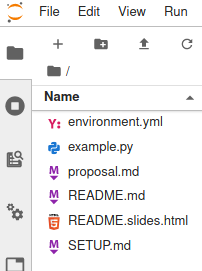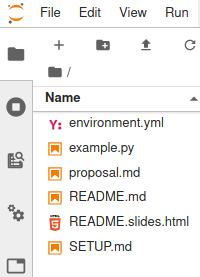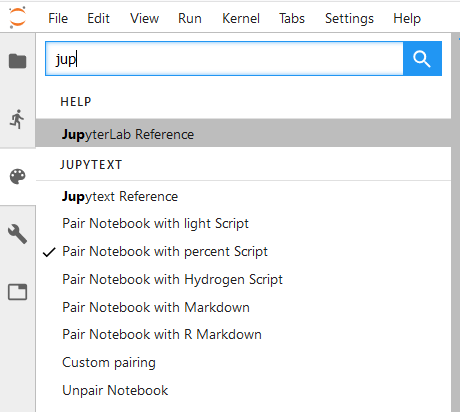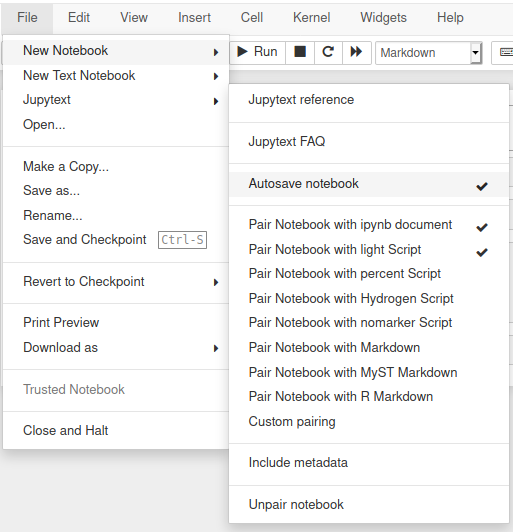Who am I¶
Marc Wouts
- Researcher at Capital Fund Management
- Mathematician by training
- Author of Jupytext
Why Jupytext?¶
Jupyter Notebooks are great!
But .ipynb files have a few limitations:
- You can only edit them in Jupyter (1)
- They are not so well suited for version control (2), (3)
(1) Well, this is changing, see Jupyter Notebooks in the IDE: VS Code versus PyCharm
(2) Too large, mix user inputs with programmatic outputs
(3) JSON is hard to merge
The idea behind Jupytext
- Keep using Jupyter Notebooks!
- Store them in a format that makes sense outside of Jupyter
Formats supported by Jupytext:
- Scripts (Julia, Python, R,...)
- Markdown files
Installing Jupytext¶
pip install jupytext or conda install jupytext -c conda-forge
Restart Jupyter... and text files become notebooks!
| Before | After | |
|---|---|---|
 |
 |
Using text notebooks¶
Demo
example.pyhas a notebook icon! Open it as a notebook.- Set the appropriate kernel and run the notebook
- Modify the file in Jupyter, save, and see the change on the script
- Modify the script in a text editor (1), and reload it in Jupyter:
- Inputs are updated
- Outputs are gone (2)
- Python variables are still there
- Add the kernel to the
.pyfile with the Include Metadata command
(1) If your edit takes more than 2 minutes, answer 'Reload' to the message in Jupyter telling you that the notebook has changed on disk, and consider a) turning the Jupyter autosave off or b) closing the notebook while you edit the text file
(2) To be solved at the next slide
Paired notebooks¶
Text notebooks with persistent outputs!
The notebook is saved to an .ipynb and a .py file.
Outputs are loaded from the .ipynb file, and inputs are
taken from the .py file if present.
Paired notebooks are robust. You can delete any file in the pair.
Share only one file, the other one will be recreated.
How to pair notebooks¶
Pairing an individual notebook in Jupyter¶
| Jupyter Lab | Jupyter Notebook |
|---|---|
 |
 |
Pairing notebooks globally using a configuration file¶
Create a jupytext.toml file with this content:
default_jupytext_formats = ipynb,py:percentYou can also pair in different subfolders:
default_jupytext_formats = notebooks///ipynb,scripts///py:percentJupytext at the command line¶
Notebook to text¶
jupytext --to markdown notebook.ipynb
jupytext --to script notebook.ipynb
Text to notebook¶
jupytext --to notebook notebook.py
jupytext --to notebook notebook.md
Text to notebook & preserve outputs¶
jupytext --to notebook --update notebook.py
jupytext --to notebook --update notebook.md
What can I do with Jupytext?¶
Version control¶
Jupytext formats are concise and have clean diffs
Merge notebooks¶
.py and .md files are easy to merge - unlike .ipynb (JSON)
Write notebooks¶
- Copy/paste content from other notebooks
- Edit your notebook in your favorite text editor
- Or in Jupyter!
Search in notebooks¶
Easily find all the references to a function or a dataset
within your notebooks!
Refactor your notebooks into libraries¶
Access to your notebooks as scripts, and refactor them:
- move your code into libraries
- document & test it!
Code style and checks¶
You like to apply flake8, black, isort on scripts?
Jupytext let you do the same on notebooks:
jupytext --pipe black notebook.ipynb
Why so many Jupytext formats?¶
Because you can do different things with them!
| Notebook content | You want? | Recommended format | Compatible with |
|---|---|---|---|
| Mostly code | A simple script | py:light |
Everything |
| A notebook-like script | py:percent |
VS Code, PyCharm Pro, Spyder, Hydrogen, PTVS | |
| Text & code | Render the .md on GitHub |
md:markdown |
VS Code, PyCharm, GitHub, ... |
| Write a book (cross references, biblio) | md:myst |
Jupyter Book | |
| Edit a notebook in Jupyter & RStudio | Rmd |
RStudio, knitr, bookdown |
Awesome projects that use Jupytext¶
Jupyter Book¶
Write a book made of notebooks
Plotly.py¶
Plotly.py's documentation is a collection of Jupytext Markdown Notebooks.
Read or edit them directly on GitHub!
AI Habitat¶
Lint notebooks with isort and black in a pre-commit hook







